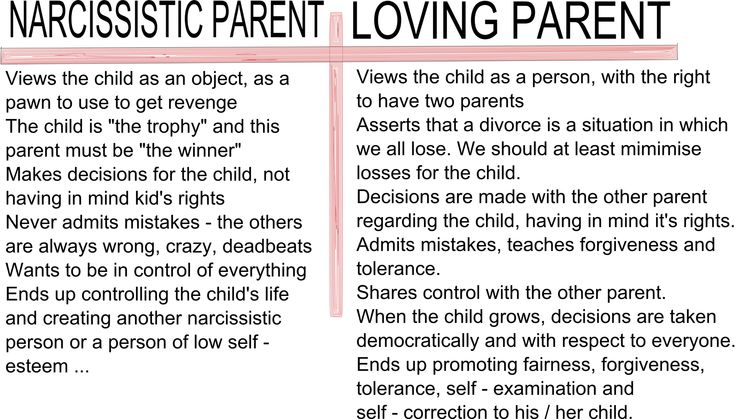


Nearly all controlling parents embody one or more of the eight "styles" of controlling parenting. These styles provide a "You Are Here" point on the map of unhealthy control. Identifying your parents’ styles can help you make sense of what didn’t jibe in your family. Remember the series of lenses an eye doctor alternates before your eyes until you find ones that enable you to see most clearly? Recognizing your parents’ styles offers the right lens that brings into focus the underlying values and themes with which you were raised. The more clearly you view your family’s themes, the more readily you can become your own person. You may find elements of one or more of these styles present in either or both of your parents:
#1Smothering Terrified of feeling alone, Smothering parents emotionally engulf their children. Their overbearing presence discourages independence and cultivates a tyranny of repetition in their children’s identities, thoughts and feelings.
Depriving Convinced they will never get enough of what they need, Depriving parents withhold attention and encouragement from their children. They love conditionally, giving affection when a child pleases them, withdrawing it when displeased.
Perfectionistic Paranoid about flaws, Perfectionistic parents drive their children to be the best and the brightest. These parents fixate on order, prestige, power and/or perfect appearances.
Cultlike Distressed by uncertainty, Cultlike parents have to be "in the know," and often gravitate to military, religious, social or corporate institutions or philosophies where they can feel special and certain. They raise their children according to rigid rules and roles.
Chaotic Caught up in an internal cyclone of instability and confusion, Chaotic parents tend toward mercurial moods, radically inconsistent discipline, and bewildering communication.
Using Determined never to lose or feel one-down, Using parents emotionally feed off their children. Hypersensitive and self-centered, Using parents see others’ gains as their loss, and consequently belittle their children.
Abusing Perched atop a volcano of resentment, Abusing parents verbally or emotionally bully — or physically or sexually abuse — their children. When they’re enraged, Abusing parents view their children as threats and treat them accordingly.
Childlike Feeling incapable or needy, Childlike parents offer their children little protection. Childlike parents, woefully uncomfortable with themselves, encourage their children to take care of them, thereby controlling through role-reversal.
From If You Had Controlling Parents: How to Make Peace With Your Past and Take Your Place in the World, published by HarperCollins Publishers. Copyright © Dan Neuharth, Ph.D.
When you were growing up, your parents...
1. Overscrutinized your eating, appearance, hobbies, or social life
2. Pressured you with perfectionistic expectations or unattainable standards
3. Forbade you from questioning or disagreeing with them
4. Discouraged you from expressing anger, fear or sadness around them
5. Violated your privacy
6. Intimidated, manipulated or overpowered you
7. Discouraged your efforts to experiment and think for yourself
8. Gave you no say in household rules and responsibilities
9. Seemed unaware of the pain they caused you or others
10. Seemed unwilling to admit they were wrong
Even today as an adult, you... 1. Feel disloyal when acting or feeling differently than your parents
2. Feel easily annoyed or impatient with your parents without knowing why
3. Feel confused by parental mixed messages
4. Are afraid to express your true feelings around your parents
5. Feel intimidated or belittled by your parents
6. Worry more about pleasing your parents than being yourself
7. Find it hard to emotionally separate from your parents
8. Talk to your parents more out of obligation than choice
9. Get tense when you think about being around your parents
10. Want to temporarily reduce or sever contact with a parent
In your adult life, you... 1. Feel perfectionistic, driven, or rarely satisfied
2. Feel intimidated or easily angered around controlling people
3. Lose yourself in relationships by automatically putting others' needs first
4. Find it hard to relax, laugh or be spontaneous
5. Feel as if you are under scrutiny even when no one else is around
6. Have an eating disorder or addictive behaviors
7. Have trouble finding a spiritual belief that feels right
8. Expect others to hurt, judge, or take advantage of you
9. Have harsh "inner critics"
10. Have trouble asserting yourself or feeling proud of your accomplishments
In raising your children, you... 1. Micromanage their eating, appearance, hobbies, or social life
2. Give affection as a reward but withdraw it as punishment
3. Criticize your children far more than you praise them
4. Violate your children's privacy
5. Override, discount or ridicule your children's strong emotions
6. Forbid your children from asking questions or disagreeing with you
7. Are unwilling to admit your mistakes in parenting
8. Believe that you own your children and that they have to earn your love
9. See your children's desires for independence and autonomy as a personal rejection
10. Inflict physical, sexual, verbal, or emotional abuse on your children





See Also:
